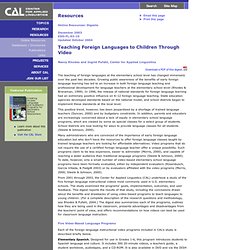

The French digital kitchen. Popular Music. Powerful Results. The music of Étienne. Digests: Teaching Foreign Languages to Children Through Video. Resources Online Resources: Digests December 2003 EDO-FL-03-10 Updated October 2004 Teaching Foreign Languages to Children Through Video Nancy Rhodes and Ingrid Pufahl, Center for Applied Linguistics Download a PDF of this digest.

The teaching of foreign languages at the elementary school level has changed immensely over the past two decades. This positive trend, however, has been jeopardized by a shortage of trained language teachers (Duncan, 2000) and by budgetary constraints. Many administrators who are convinced of the importance of early foreign language education but who don’t have the resources to offer foreign language classes taught by trained language teachers are looking for affordable alternatives. From 2001 through 2003, the Center for Applied Linguistics (CAL) undertook a study of the five foreign language instructional videos most commonly used in U.S. elementary schools.
Five Video-Based Language Programs Elementary Spanish. Español para ti. Muzzy. SALSA. Saludos. 1. Teach French - Get into teaching - Teaching Agency. Why teach French?

French is ranked as the second most influential language in the world and is the second most frequently used language on the internet. It has influenced English heavily and it is estimated that English speakers who have never studied French already know many French words. It is no surprise that it is also one of the main three modern foreign languages (MFL) taught in secondary schools in England. Teaching French can therefore provide you with clear career progression opportunities and you could earn a competitive salary Our enhanced service, Premier Plus, is available to those who wish to start training for a shortage subject such as French in the academic year 2014/15, and hold (or are predicted) a first class, 2:1 or 2:2 degree.
Ready to take the next step? Sign up with us to take advantage of our Premier Plus service to receive one-to-one advice and exclusive benefits. Early French immersion entry point controversy continues - New Brunswick. The entry point for early French immersion was increased to Grade 3 about four years ago.

(CBC) Some anglophone parents are still unhappy with the options for learning French as a second language in New Brunswick and are opting for the francophone system instead. Four years ago, the former Liberal government moved the entry point for early French immersion to Grade 3 instead of Grade 1. A task force recently recommended moving the entry point back to Grade 1, but to keep it at Grade 3 for the 2012-13 school year. Tracy Lipton McClusky, a graduate of early French immersion, who married a francophone, wanted early immersion for her twin boys who started kindergarten this week. But she ended up choosing the francophone system because she doesn't like the later entry point for immersion. 'We kind of felt strongly that we wanted to start as early as possible so at that point the decision had already been made.' She said the best solution would be going back to immersion that starts in Grade 1.
The foreign language GCSE you can pass without speaking a single word. By LAURA CLARK Last updated at 21:29 21 December 2007 Students will be able to gain a GCSE in a foreign language without speaking a word of it, exam chiefs revealed yesterday.

New "short" GCSEs in French, Spanish or another language will simply test candidates' reading and writing skills. An alternative short course focuses on speaking and listening, meaning students can get a qualification without being able to read or write the language. Scroll down for more... The short courses are worth half a GCSE and count towards a school's ranking in national exam league tables. Pupils studying full language GCSEs or language short courses in their current form must demonstrate speaking, listening, reading and writing skills.
However, a Government-backed inquiry concluded that languages GCSEs are perceived as too hard by many students. Experts yesterday questioned the wisdom of making short courses easier and warned that students would be left unprepared for further study. Now students will be able to pass foreign language GCSEs without speaking a word as oral exams are 'too stressful' By LAURA CLARK Last updated at 20:09 17 February 2008 {2}The French oral is to be scrapped for GCSE pupils.

Speaking tests for foreign language exams are "too stressful" for teenagers, officials have decided. Instead, those taking French and other languages will be assessed by their teachers in class. Lord Dearing, who conducted an inquiry into language teaching, said the stress of the speaking test, which lasts about ten to 12 minutes, deterred pupils from taking language GCSEs.
His report last year, accepted by ministers, said: "We...proposed a new approach to the assessment of speaking and listening, which rightly account for half the marks in the GCSE, on the grounds that the present method is too stressful and too short to be a reliable way of assessing what the candidates can do. "It is interesting that when people spoke about the oral test, that however long ago it may have been, it is often remembered as a stressful experience. Critics said the change would damage GCSEs.